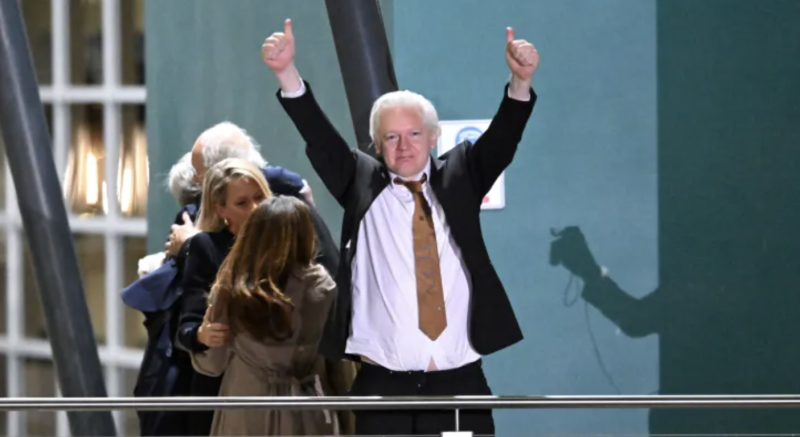
Julian Assange, the WikiLeaks founder, has arrived in Australia after pleading guilty to a single charge under the Espionage Act of conspiring to unlawfully obtain and disclose national defense information. Assange appeared in an American courtroom in the Northern Mariana Islands, a US commonwealth in the western Pacific, on his way to Australia.
Who is Julian Assange and what did he do?
Julian Assange is an Australian computer programmer and hacker who founded WikiLeaks in 2006. WikiLeaks published leaked confidential and restricted official material, related to war, diplomacy and intelligence operations. The website shot to global prominence in 2010 for publishing a video from a US military helicopter that showed the Apache gunship killing 11 Iraqi civilians in Baghdad. WikiLeaks also published thousands of confidential documents and reports supplied by former US Army intelligence analyst Chelsea Manning, which revealed that the US military had killed hundreds of Afghan civilians in unreported incidents during the war in Afghanistan.
The US claimed that these leaks endangered the lives of American military personnel, and Assange was accused of conspiring to break into US federal government and military databases to acquire classified information.
American officials sought to have Assange extradited to the US to face trial, whereas he maintained that the charges against him were politically motivated because he exposed serious abuses of power by American military officials.
Is WikiLeaks still around?
WikiLeaks is still around, and is led by Icelandic journalist Kristinn Hrafnsson, who served as the current editor in chief. The website spent a lot of time in the news in 2016 for publishing thousands of leaked emails from Hillary Clinton’s campaign manager John Podesta before the presidential election.
Many view WikiLeaks as a bastion of whistleblowing, and critical for exposing secrets that governments, their militaries and intelligence agencies and multinational corporations would like to remain hidden.
What legal trouble did Assange get into?
In 2010, not long after WikiLeaks published classified footage of the Apache gunship killing civilians in Baghdad, the Swedish Prosecutor’s Office issued an arrest warrant for Julian Assange on one allegation of rape and another of molestation.
In 2012, Assange sought refuge in the Ecuadorean embassy in London, as Ecuador granted him asylum.
Throughout this time, the US government wanted him arrested. In 2017, Swedish prosecutors dropped the rape investigation against Assange.
In April 2019, the British police stormed the Ecuadorean embassy in London and arrested Julian Assange for his failure to appear in court over a warrant issued in 2012.
Assange also faced 18 felony charges brought by the US Department of Justice in 2019, 17 of them under the Espionage Act, including the charge to conspire to obtain and disclose national defense information.
Assange was held in Belmarsh Prison for a total of 1,901 days. During this time, the US government won a bid to overturn the decision not to extradite him to the US. His extradition order was signed by the UK home secretary in April 2022, and he only managed to appeal later in July.
Why has Julian Assange been released?
After negotiations with American authorities over a plea deal, Assange was granted bail by a London High Court and left the UK on a chartered airplane from Stansted Airport. The deal was reportedly a consequence of intense diplomatic pressure from Australia, particularly Prime Minister Anthony Albanese.
The deal with US authorities involved Assange pleading guilty to a single count of violating the Espionage Act. Prosecutors recommended a five-year prison sentence as part of the deal, although Assange will serve no time as he will be credited for the 62 months he spent imprisoned in Belmarsh Prison in the UK.
On June 25, 2024, Assange pled guilty to one count of a breach of the Espionage Act in an American courtroom in Saipan, the capital of the Northern Mariana Islands, a US commonwealth territory in the Western Pacific, and was allowed to return to Australia as a free man.
